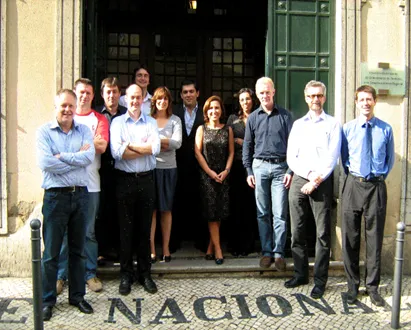Why did you decide to have an IRI?
“We decided to host an IRI because I understood that it would be the best way to show the high management of the Inspectorate the things that we needed to improve in our organisation. It’s also an unique opportunity to have an international team of experts analysing the way you do things to find out how you can make it more efficient.”
What was it like having a review team in your organisation for 4 days?!
“You have to be aware that during those 4 days almost everything else in your own organisation has to wait until the IRI is over. It completely involves the host team and other people in your organisation. It’s important to have the support of senior management. It’s also important that the people in your organization that are involved in the review week, are aware of the objectives and importance of having the IRI so that you can get full internal cooperation. It’s always “extra” work that you are asking for, so people show a better attitude towards it if they really understand the meaning of having an IRI and the advantages that it can deliver.”
Was the review useful for the staff that took part?
“Yes. The IRI was also an opportunity for the staff to “stop” and think about their own organization and about the reason certain procedures are in place. It also enables staff have a “helicopter” view of their own organization because they clearly see how the work that they develop is linked to other colleagues’ work and how we are all working for the same overall goal.”
What has changed as a result of the review?
“The major recommendations of the IRI were taken into account in our 2010 activity plan, which means that they will actually be implemented in the Inspectorate. In the beginning of March 2010, the OECD evaluated the performance of the Portuguese environmental policies (OECD Environmental Performance Review of Portugal) and IGAOT was one of the chosen authorities to contribute to that process. The IRI results helped us to show OECD how our Inspectorate is performing.”
How would you rate the experience overall?
“Very positive. Inspiring. Broadens the horizons. Contributes to improve the organisation culture.”
Any funny/ interesting stories from the review?
"The chosen restaurant for the lunches did not have a great variety of vegetarian food. So our team leader, Simon Bingham, had to eat eggs every single day. We were afraid that he would become a chicken in the end of the review. So it’s important to be aware of the diet requirements of the members of review team in order to have everyone satisfied!”
Would you do it again?
“Yes, but after having fully implemented the previous IRI recommendations.“
Any suggestions for improving the scheme?
“Having more support from IMPEL in the preparation phase (beginning with the establishment of the review team), having special attention with the experts that are part of the review teams (every member of the review team has to be aware of what an IRI and has to know the DTRT methodology). Having some kind of support from IMPEL to implement the recommendations of the IRI. Disseminate the major conclusions of the IRI on the IMPEL website in a “technical resume” (this would be easier to read than the whole final report of the IRI).”

